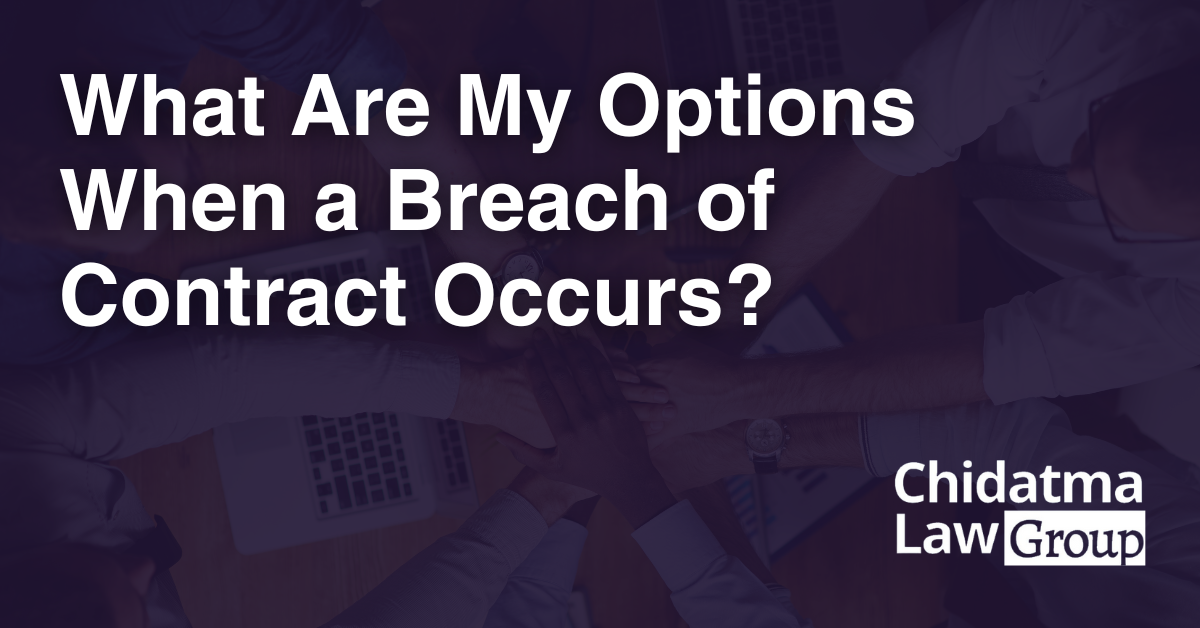
When a business contract falls apart, it can throw a wrench into your business operations, cause financial strain, and in some cases, damage professional relationships. At Chidatma Law Group, we understand how disruptive a breach of contract can be for small businesses and entrepreneurs in New York. Whether it’s a vendor who didn’t deliver, a client who didn’t pay, or a partnership that fizzled out, knowing your legal options is key to moving forward.
Our experienced business attorneys have helped clients across industries resolve contract disputes with clarity and confidence. Here’s what you need to know if you find yourself on the wrong side of a broken agreement.
What Counts as a Breach of Contract in New York?
Not every disagreement is a breach. In legal terms, a breach occurs when one party doesn’t fulfill their obligations as set out in a valid contract. This can happen in a few ways:
- Failure to perform: One side doesn’t do what they agreed to (e.g., missing a deadline or not delivering goods).
- Defective or incomplete performance: Work was done, but not to the standard or scope specified.
- Anticipatory breach: A party makes it clear they won’t meet their obligations in advance.
A careful review of the contract’s language is the starting point. If the breach seems minor or unclear, a lawyer can help you assess whether it rises to the level of legal action.
Common Options for Responding
If you’re facing a breach of contract, your next steps will depend on the details of your contract and the nature of the breach. Here are some common options:
1. Open a Line of Communication
Not every breach needs to lead to court. Sometimes a conversation is enough to get things back on track. In fact, many contracts include notice-and-cure provisions, which require you to give the other party a chance to fix the issue before taking formal action.
- Document your outreach.
- Be specific about the breach and what resolution you’re seeking.
- Set clear deadlines.
If that doesn’t work, you still have more tools at your disposal.
2. Negotiate a Resolution
A negotiated agreement can save time, money, and energy. With the help of a business attorney, you may be able to:
- Modify the existing agreement.
- Extend timelines.
- Reduce payment obligations or adjust the scope.
This approach is especially useful if you want to preserve the relationship or if both parties bear some responsibility.
Our team can help with business transactions to renegotiate terms that align with your goals.
3. Mediation or Arbitration
If informal negotiations don’t resolve things, the next step might be alternative dispute resolution (ADR). This is a structured process that doesn’t require going to court.
- Mediation involves a neutral third party who helps both sides reach a compromise.
- Arbitration is more formal and results in a binding decision by a neutral party.
Many contracts include ADR clauses, so it’s worth checking whether yours requires mediation or arbitration before litigation.
4. File a Lawsuit
When other avenues fail or aren’t appropriate, litigation may be necessary. In New York, you can sue for:
- Damages: Financial compensation for losses caused by the breach
- Specific performance: Forcing the breaching party to carry out their end of the agreement (used in limited cases)
- Rescission: Canceling the contract entirely
Court can be time-consuming and costly, but it also provides legal remedies that negotiations cannot. Working with a business law attorney ensures you file the right type of claim, within the appropriate deadlines, and with a strategy tailored to your needs.
When You’re the One Accused of Breaching
What if someone claims you broke the contract? Don’t panic. You may have valid defenses if:
- The contract was unclear or incomplete
- You performed your duties reasonably
- The other party breached first
- Unforeseeable events made the contract impossible to fulfill
It’s important to respond promptly and professionally. A lawyer can help you understand your rights and work toward a fair resolution.
How Legal Support Makes a Difference
Contract disputes are rarely black and white. Even with a signed agreement, enforcement and interpretation aren’t always straightforward. That’s why it helps to have legal guidance early on, whether you’re considering action, facing a claim, or trying to prevent issues in the first place.
At Chidatma Law Group, we:
- Review contracts to identify risks and unclear terms
- Guide clients through negotiations and settlement efforts
- Represent businesses in court and arbitration
- Help clients avoid repeat issues with stronger future agreements
We also encourage clients to revisit their agreements regularly.
Being Proactive Saves Time and Money
The best time to think about contract disputes is before they happen. Clear, well-drafted agreements help reduce confusion and give you a stronger footing if things go wrong. But even the best planning can’t prevent every issue. When a breach does happen, knowing your options helps you respond strategically instead of reactively.
If you’re unsure whether a breach has occurred or what to do next, reach out to the team at Chidatma Law Group. We’re here to help you move forward calmly, confidently, and with your business’s long-term success in mind.
Contact us to set up a consultation and take the guesswork out of your next move.

